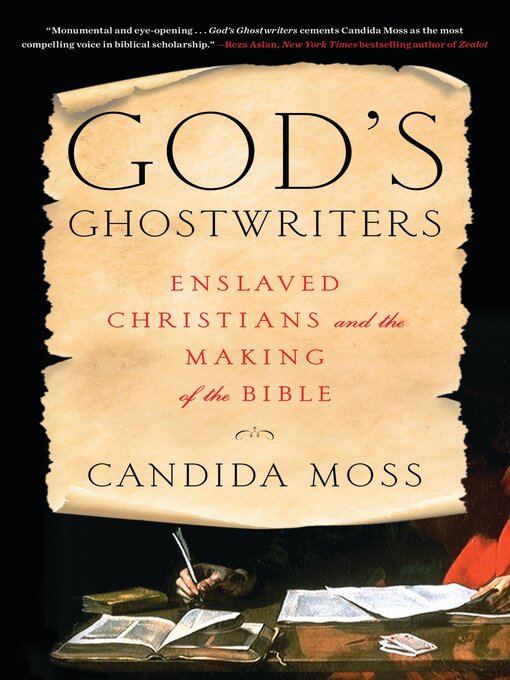For the past two thousand years, Christian tradition, scholarship, and pop culture have credited the authorship of the New Testament to a select group of men: Matthew, Mark, Luke, John, and Paul. But hidden behind these named and sainted individuals are a cluster of unnamed, enslaved coauthors and collaborators. These essential workers were responsible for producing the earliest manuscripts of the New Testament: making the parchment on which the texts were written, taking dictation, and refining the words of the apostles. And as the Christian message grew in influence, it was enslaved missionaries who undertook the arduous journey across the Mediterranean and along dusty roads to move Christianity to Rome, Spain, and North Africa—and into the pages of history. The impact of these enslaved contributors on the spread of Christianity, the development of foundational Christian concepts, and the making of the Bible was enormous, yet their role has been almost entirely overlooked until now.
Filled with profound revelations both for what it means to be a Christian and for how we read individual texts themselves, God’s Ghostwriters is a groundbreaking and rigorously researched book about how enslaved people shaped the Bible, and with it all of Christianity.
-
Creators
-
Publisher
-
Release date
March 26, 2024 -
Formats
-
Kindle Book
-
OverDrive Read
- ISBN: 9780316564694
-
EPUB ebook
- ISBN: 9780316564694
- File size: 9866 KB
-
-
Languages
- English
-
Reviews
-
Library Journal
October 1, 2023
The New Testament is generally attributed to Matthew, Mark, Luke, John, and Paul, but Moss, an award-winning biblical scholar who serves as Edward Cadbury Chair of Theology at the University of Birmingham, argues that they worked with enslaved coauthors and collaborators who have gone uncredited. These collaborators produced the earliest manuscripts, edited the final works, and carried the texts throughout the Mediterranean, reading them aloud to crowds. With a 45,000-copy first printing. Prepub Alert.
Copyright 2023 Library Journal
Copyright 2023 Library Journal, LLC Used with permission.
-
Publisher's Weekly
November 27, 2023
Moss (The Myth of Persecution), a theology professor at the University of Birmingham, argues in this erudite outing that enslaved people played a vital role in fashioning the gospels and Paul’s epistles. She cites evidence that the apostle Paul may have had “enslaved attendants” who helped him master his “raw material into conventionally acceptable forms” by “elevating and clarifying” his writing, and that gospel writer Mark himself may have been enslaved and taken dictation from the disciple Peter. Elsewhere, Moss posits that enslaved messengers in the first and second centuries served as “interpretive guides,” performing the scripture they delivered to audiences across the Roman Empire to Galilee, translating texts “into different cultural registers,” and validating and “answer for the message itself.” Links between scriptural content and sociohistorical background intrigue, including how the “relentless violence of hell” depicted in the Bible “makes sense in the context of an ancient social order and system of justice that fiercely punished the socially disenfranchised.” Acknowledging that “all reconstructions of the ancient writing process are necessarily imaginative, Moss draws on primary sources and studies of enslavements in other periods, including the antebellum U.S. South, resulting in a work that leans heavily on speculation. Still, students of Christian history will find plenty to appreciate in this innovative reinterpretation. -
Kirkus
March 1, 2024
A study of the forgotten writers behind the Christian scriptures. Moss, the chair of theology at the University of Birmingham and the author of The Myth of Persecution, sets out to uncover the labor of enslaved people in the writing, editing, and copying of the New Testament. The author provides a wide-ranging overview of the role of slavery in the ancient Mediterranean world, especially the use of enslaved people as readers and writers. Using conjecture, she links the Gospel writers and Paul, especially, to literate people enslaved under Roman rule, beginning with the known fact that Paul dictated his words to scribes. However, her attempts to tie specific New Testament writings to enslaved labor are largely unconvincing. For example, Moss posits a scenario in which Paul speaks through a prison window to a scribe, who must squat on the pavement all day writing down Paul's words, which the scribe would then have some sway over; she also searches for hidden slave language and meaning in the Gospels, inferring, for instance, that certain aspects of Jesus' teachings were directly influenced by enslaved writers. Her arguments are thought provoking, but it is nearly impossible to know, 2,000 years later, what the exact situations were, what role in society scribes occupied, and what liberties they may have taken with texts. Nevertheless, Moss sees her goal in this study as doing the "reparative work" of rediscovering the role and agency of enslaved persons in the formation of the Christian scriptures. To a degree, she has done just that--even if she leaves readers with more questions. An intriguing thesis, but Moss overreaches.COPYRIGHT(2024) Kirkus Reviews, ALL RIGHTS RESERVED.
-
Formats
- Kindle Book
- OverDrive Read
- EPUB ebook
Languages
- English
Loading
Why is availability limited?
×Availability can change throughout the month based on the library's budget. You can still place a hold on the title, and your hold will be automatically filled as soon as the title is available again.
The Kindle Book format for this title is not supported on:
×Read-along ebook
×The OverDrive Read format of this ebook has professional narration that plays while you read in your browser. Learn more here.



